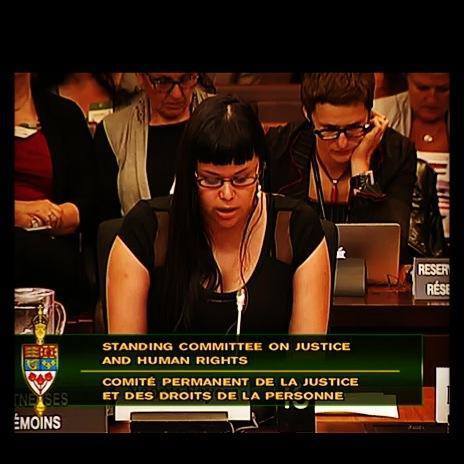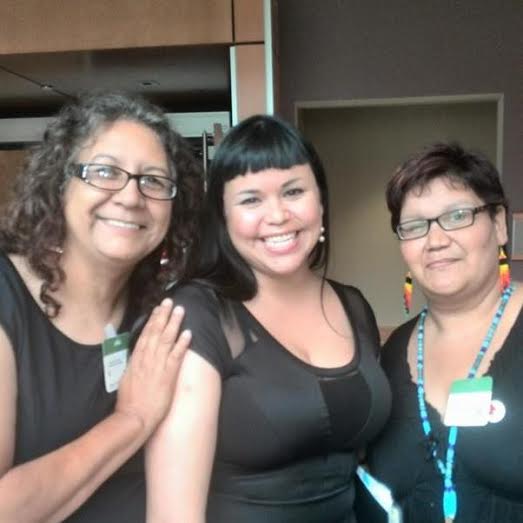
When I woke up in Ottawa back in July 2014 after flying in from out west, there was a huge knot in my stomach. I did not want to go to the morning hearings on C-36, the anti-prostitution bill proposed in response to the Bedford decision that had invalidated three sections of Canada’s prostitution laws. But I mustered up the energy to attend and listen to what Justice Minister Peter MacKay had to say.
The room was packed and there were people standing all the way to the back. I came in a bit late. As I listened to the Justice Minister say that the bill would protect the exploited, it became clear he knew very little about how criminalization affects the most marginalized populations.
By the time the afternoon sessions started, the tension in the room was heavy. As I sat up there next to my peer nearing the end of our session, I wondered if my friends were able to make it inside. Throughout the entire session one Conservative MP kept asking me questions like whether Indigenous women have a free choice to enter into prostitution, whether I encountered any Indigenous women who were exploited, and whether the New Zealand model reduced the number of street-based sex workers in NZ. I reminded the MP that the New Zealand model’s goal was not to eliminate street-based prostitution but to provide protection and safety to street-based prostitutes.
Then, just as I started to feel alone and frustrated as the only Indigenous woman who supported decriminalization on the panel that day, I turned around and noticed my friends. They made it in! When I looked at them sitting behind me along the side of the room, they waved and smiled. I remember one giving me the thumbs up. I did not feel alone anymore—I had an army of fierce Indigenous women and allies supporting me, sitting right behind me.

Last June, Canada’s Justice Minister introduced C-36, the Protection of Communities and Exploited Persons Act. The Act replaces the criminal code provisions found unconstitutional in the Bedford decision in 2013, which declared them in violation of sex workers’ rights to life, liberty and security of person. The bill, now law, does not respond to any of the issues raised in the constitutional challenge and it completely ignores over 25,000 pages of evidence in the Bedford decision itself documenting the fact that the harms workers faced in prostitution arose because of the laws themselves.
Though the entire Act is a gross violation of sex workers’ rights, three things make C-36 as a law particularly objectionable: First, the government reintroduced the communication provision, criminalizing communication with any person for the purposes of offering or providing sexual services for consideration in a public place, or in any place open to public view or places next to a school ground, playground or daycare center. The law doesn’t specify the distance that falls within violation of this law. So if a sex worker has a neighbor who runs a private daycare center, he/she may be criminalized.
Second, the government also introduced the concept of “material benefit” in an attempt to distinguish it from the living on the avails provision that was struck down. But there is no difference between the new law and the living on the avails sections. There are more explicit references to “commercial enterprises” and in the Department of Justice technical paper, commercial enterprises may include strip clubs or agencies. This new law criminalizes “everyone who receives a financial or other material benefit…” derived from the selling of sexual services. The new law also assumes that a person who is charged with “habitually” being in the company of a sex workers is guilty of exploiting them, unless evidence shows otherwise.1 This goes against our Charter—individuals are presumed innocent until proven guilty. The new law potentially forces sex workers to admit that they were engaging in a criminal act, like selling sexual services or advertising sexual services, in order to rebut the presumption that anyone who is habitually in their presence is exploiting them. In other words, it is up to sex workers to prove their relationships are not exploitative.
Third, the government criminalized advertising sexual services, including online and print advertisements. They also conflated such advertisements for sexual services with child pornography, when they are obviously not the same thing.
I was one of two people who attended the bill’s parliamentary committee hearing on behalf of the Canadian Alliance for Sex Work Law Reform. Throughout all of 2014 to this point, the government ignored sex workers’ voices. For instance, the private consultations on the new law that began in early 2014 only included three sex workers at the table and the Justice Minister, as noted by my colleague in her testimony, “made it very clear that he did not intend to consult with Canada’s sex workers.” They also tried to conflate prostitution with human trafficking, and then human trafficking with slavery (which has clear racist undertones). Many people suggested that the bill be sent to the SCC for a reference2 decision to ascertain the constitutionality of the law. The government even ignored these valid suggestions from legal scholars. Government representatives just kept repeating that this new law would protect the “victims” and was Charter compliant.
Inside, the room was packed. The anti-sex workers took up a lot of space. They became incensed when one of the Liberal MPs used the term “sex worker” for the first time that day. I witnessed them fuming in their little pink cardigans and matching pearl necklaces and earrings. Actual pearl clutchers clutching their pearls.
Some antis remained there for the whole week. The privilege that many antis enjoy was evident in their ability to cover costs for an entire week, including food, travel and rooms. This privilege also enabled them to afford the time away from work to sit in a crowded room heckling sex workers, sex work activists, and allies.

When it came time for the organization, CASWLR (the Canadian Alliance for Sex Work Law Reform), I represented to testify, it was very difficult to actually enter the building. The anti-sex workers swarmed the entrance.
When we sat down at the table, Émilie Laliberté and I sat next to each other. The chair of the meeting reminded us that we only had ten minutes between the two of us. We had very little time to include important points centered on the experiences of sex workers, both current and former.
Émilie Laliberté went first. When she spoke, she spoke at a fast pace given the time limit. The chair asked her to slow down, and granted her an additional minute to speak. This made the antis behind us gasp, sigh, and heckle us loudly. They continued this disruptive behavior when others testified against the bill throughout the week.
During my statement, I had to hold back my tears when I read Chief Justice McLachlin’s words, “If screening could have prevented one woman from jumping into Robert Pickton’s car, the severity of the harmful effects is established.” This new law ignores these words and demonstrates a total disregard for sex workers’ right to life, liberty, and security of person.
As I sat there, I thought, “The old laws criminalized the women that Pickton preyed on and the new laws will criminalize women that predators like Pickon preyed on. Nothing has changed!”
Yet, there we all were in this room filled with a bunch of “anti-violence” organizations who were literally cheering the passing of these new laws. The old laws enabled Pickton to prey on sex workers and the new laws will also enable predators to continue to prey on sex workers. They were applauding laws that led to our deaths.
During the hearing, one Conservative MP asked me if I thought sex work was a free choice if Indigenous women rely on money from the sex industry to survive—as if he didn’t rely on the money he receives as an MP to survive. I asked him “Would you do your work without being paid?” and he ultimately admitted to not wanting to do his work for free. It is such an absurd double standard, requiring sex workers to do their work for free for it to be considered a “free” choice.
I began receiving harassing messages at the beginning of the year through social media and via comments on my blog. After I testified, the amount of harassment and abusive messages was unimaginable and something I would never wish on anyone.
As we know, the bill passed and we have to look at the effects of the law. The realities for outdoor sex workers have not changed. The old laws criminalized communication and the new laws continue to do so. The old laws criminalized basic safety mechanisms like screening and the SCC found that increases the risks that outdoor sex workers face, in part by preventing them from setting the terms and boundaries of a potential date. The evidence demonstrated that this pushes outdoor sex workers to the periphery, forcing them to work in dark alleys or parkways. The old laws forced them to work in the literal shadows of society where predators like Pickton knew they were vulnerable. Sex workers will continue to be vulnerable under C-36.
For indoor sex workers, the situation isn’t much better, especially for Indigenous, racialized, or migrant sex workers who are already hesitant to call the police if they experience violence. One Indigenous indoor sex worker I conversed with recently admitted that potential clients are not following her screening methods, saying that men are not willing to provide basic screening information, like verifying identity with identification. Clients are suggesting that she prioritize their risk of invasion of privacy and potential arrest over her right to safety. She said to me, “All I want is to verify their name. Someone tried to murder me before. This is why I screen.”
I fear that these new laws will push sex workers so far into desperation that they will be forced to accept dangerous clients. This is my greatest fear, that one day my friends will be put in similar positions as the women targeted by Pickton and that they will not want to call for help out of fear of arrest. This fear was validated when Conservative Senator Plett admitted at the Senate hearing for C-36 that the law’s goals was not to make prostitution safer: “Of course, we don’t want to make it safer for prostitutes. We want to do away with prostitution.”
Naomi Sayers’ Statement
1. There are a number of limited contexts where this law does not apply. For instance, the law does not apply to those people who are in “legitimate living arrangements” or if the person has received the “benefit in consideration for a service or good that [the sex worker would] offer, on the same terms and conditions, to the general public.”
↩
2. A reference decision is not legally binding but it acts like an opinion to the government from the SCC on a particular issue. ↩
When you merely read (never mind actually experience) how utterly pernicious the entire Senate hearings(actually pitch mob heckling by antis) ,the understandable reflex action is to spill the beans on those Conservative MPs who visited sex workers in the past .
It must be similar to a rape victim who tells her horrific story only to be sniggered at as deserving it for the way she dressed or looked or acted ,all the whilst the ‘decent,good’ girls sneered at her misfortune.
All i know is that i wouldn’t have the moral courage to stand up for truth and honesty in the face of such deliberate provocation,condescendation and frankly hatred as you and others have done.
Its why sex workers and advocates deserve so much admiration for their courage . Ultimately , sex workers rights are destined to triumph in Canada as well as worldwide though the battle will be long into the future.
You are amazing. Thank you for your compassion and hard work, and thank you for explaining the details of this new law.